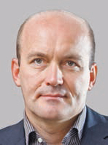
SEPOMO

Description
- Programme: Horizon 2020, Marie Skłodowska-Curie Innovative Training Network (ITN)
- Funding amount: €3.8 million, of which €500,000 for Bavaria
- Period: 10/2016-09/2020
- Coordinator: University of Groningen, The Netherlands
- Project ID: 722651
- Website: www.sepomo.eu
Junior researchers use electronic spin to improve solar cells
To increase the energy yield of organic solar cells, the EU project SEPOMO (Spins for Efficient Photovoltaic Devices based on Organic Molecules) is seeking to obtain a better understanding of the “spin” mechanism, that is to say, the intrinsic angular momentum of electrons. At the same time, the project network will provide training to young scientists for their future industrial career in the field of optoelectronics.
As an “Innovative Training Network”, SEPOMO has two objectives. On the one hand, the project partners have a training mandate: new, innovative technologies require a new generation of well-trained scientists who know how to use those technologies and develop them further. The training programme for the 15 doctoral students to be recruited for the project is both interdisciplinary and intersectoral. Workshops on soft skills such as scientific writing and presenting or project management complete the training.
On the other hand, the project is dealing with the optimisation of organic photovoltaic (OPV) solar cells. A solar cell essentially works by converting light into electrical charge carriers. In OPV cells, this is achieved using organic conductive polymers or molecules. OPV cells are environment-friendly and versatile, but they lag behind conventional, e.g. silicon solar cells, in terms of efficiency.
The scientists hope to use the “spin” mechanism to remedy this. Spin is an intrinsic angular momentum of electrons which – besides other properties – describes their state. In organic semiconductors, the spin can be modified under certain conditions and depending on the chosen material, making the lifetime of charge carriers in solar cells longer, thus preventing the unwanted losses.
The project partners have drawn up a four-year plan to gain a better understanding of the principles underlying this mechanism and, on that basis, to design and synthesise suitable new organic materials. By the end, it is hoped to achieve a relative increase in solar cell performance of 20 % as a prototype on active areas of 1 cm2.
BayFOR@Work
- Identifying the EU call
- Providing advice and support for the application
- Revising the application
- Preparing the training plan
- In the ongoing project: partner organisation (training)
Comment on BayFOR’s contribution

“I have worked closely with BayFOR over many years. For the SEPOMO project, firstly they identified a suitable call for proposals and secondly, they prepared a training plan for the doctoral students which is now proving very effective in the ongoing project. BayFOR’s long-standing experience of ITN projects was a great help to us. They were also on hand throughout the application phase to give us reliable advice and assistance."
Prof. Dr. Vladimir Dyakonov
Experimental Physics 6
University of Würzburg
SEPOMO Project partner
Tel.: +49 (0)931 3183111
E-Mail: dyakonov@no-spam-pleasephysik.uni-wuerzburg.de
Your contact at BayFOR

Dr. rer. nat. Panteleïmon Panagiotou
Head of Unit Information & Communication Technologies |
Engineering & Natural Sciences
Phone: +49 89 9901888-130
Email: panagiotou@no-spam-pleasebayfor.org




